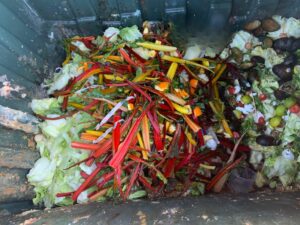Posts Tagged ‘SB 1383’
Commercial Surplus Food: Data & Extraordinary Successes
Our team presented to the City of Encinitas Environmental Commission about SB1383 and how Solana Center is helping businesses prevent food waste. Executive Director Jessica Toth, Associate Manager Larissa Amaral, and UCSD Scripps Researcher Skylar Enge shared our success in preventing food waste and edible food donations to families in need. California’s SB 1383 is…
Read MoreSB 1383 Update: Organics Recycling Compliance Enforcement Changes in 2024
Senate Bill 1383, or the Short-Lived Climate Pollutant Reduction law, requires that businesses implement programs to ensure organic materials are no longer put in the trash, with edible food being donated and the rest sorted for organic waste recycling. Before the start of 2024, jurisdictions were required to visit Tier One and Tier Two (see…
Read MoreMethods to Reduce Waste
Waste occurs in many areas of a business, but each cause of waste has a myriad of solutions that will reduce waste, save money, and build a more dedicated team and customer following. Once you understand what is being wasted in your business and why, you can begin to reduce this waste by implementing some…
Read MoreUnderstanding Your Business’s Waste
The first and most important step to reducing waste is understanding what you are wasting and why. Food waste from restaurants can occur before the food is served from over-ordering ingredients, improper storage, and inefficient menus, or after the customer has received the food because of too large portion sizes and wasteful serving practices. There are…
Read MoreFood Recovery and Donation
Reducing is always the best method to solve our food waste problem, but when we are not able to reduce, we can still rescue and divert in order to use food waste as a valuable resource and not add it to the landfill. If the food is still edible, donate it to help those in…
Read More




